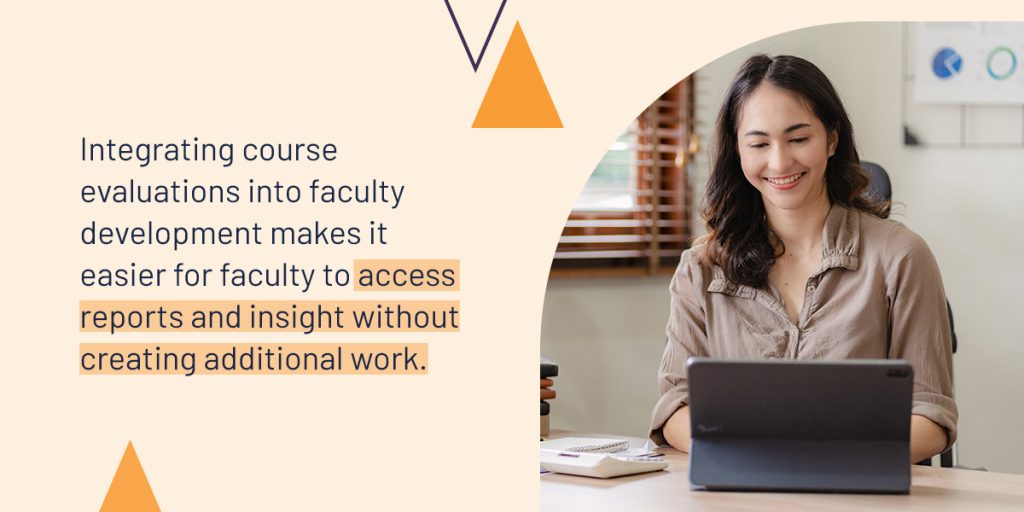




Higher education institutions thrive on quality student feedback. This feedback is extremely beneficial to institutions seeking deeper insight into the student experience. However, for many institutions, the course evaluation process needs fine-tuning to generate better results. With the right integrated solutions, this process can be seamless, especially for institutions using Canvas.
There are three key areas of integration between course evaluations and Canvas:
Leveraging these three elements can help your institution efficiently and effectively collect course evaluations and analyze the results to empower improvements.
Data integration in course evaluation simplifies the process of crafting and distributing evaluations to students as well as accessing evaluation results. Canvas already houses all your course, student, and instructor data, making it easier to automate the flow of this data from Canvas into the course evaluation project, eliminating tedious and redundant work.
Enrollment refresh capabilities allow you to align Canvas enrollment updates with your course evaluation enrollments automatically. The resulting process is more accurate than manual data uploads and takes less time. Instead of waiting for results to be manually uploaded, you can access the course evaluation results in real time. Survey administrators can search for and select the courses that need evaluation from Canvas, import all the relevant data around those courses and enrollments, and schedule automated syncing.
Using data integration in course surveys gives you immediate access and allows you to adjust courses and address student concerns as they arise. Rather than having a set time for evaluations, you can continuously monitor student sentiments while developing and delivering your courses. Data integration allows you to carry out pulse surveys to quickly adapt and make the necessary changes to give students what they need.
To maximize this data integration advantage, choose a centralized evaluation solution that integrates with Canvas for standardized data collection.Create standardized processes and survey instruments for each department to customize according to their needs. Establishing institution-wide survey approaches ensures consistent data quality and improves data collection efficiency. Rather than having to build surveys from scratch, faculty members can access standard templates and easily adapt them to their requirements.
Canvas data then makes it easy to distribute evaluations to students enrolled in the program under review. As students complete the surveys, lecturers and administrators gain real-time access to results. Because of your standardized approach, you can then conduct meaningful comparative analyses of data from various classes and courses.
Getting students to participate in surveys is critical to the success of your course evaluation process, but institutions often find this challenging. Rather than using a different platform for course evaluations, your institution can integrate surveys into the system your students already know. This integration makes it easy for all students to access the surveys from anywhere, at any time. Seamless integration between Canvas and your course evaluation system can significantly increase response rates through functions like:
Together, these features make surveys more accessible to students, driving response rates and helping you gather the information crucial to improving your programs. Once students have completed their responses, the data flows directly into solutions, so trends and analysis are immediately available.

Our faculty interface within Canvas streamlines the delivery of results and analytics to faculty. Integrating course evaluations into faculty development makes it easier for faculty to access reports and insight without creating additional work. During the survey period, you can keep your faculty informed through integrated dashboards that show real-time response rates and highlight the number of days remaining in the survey window. Faculty can also receive notifications about their results and then seamlessly access a variety of course evaluation reporting and analytics tools directly within Canvas.
Sharing results with faculty is essential for their personal growth and development. They can assess the overall trends to keep track of their goals and whether their teaching style and the changes they make positively impact their students.
Faculty looking to improve their teaching approaches will benefit from access to advanced reporting functions from your Course Evaluations & Surveys through Canvas. For example, AI-powered sentiment analysis can provide deep insights from open-response questions. Cutting-edge AI tools can analyze patterns in large batches and arrive at actionable insights to meet student needs and enhance engagement. These insights can help lecturers set goals to improve teaching effectiveness and track progress from one evaluation to the next.
Once faculty receives the feedback, they need to review the results and take steps to make necessary changes. If students complete evaluations, yet everything stays the same, they will soon lose interest in giving feedback.
If your institution aims to promote accessibility and inclusion, reporting functions from Course Evaluations & Surveys integrated with Canvas data let you analyze results by demographics and identify disparities. Faculty can then share these reports through Canvas to collaborate on making programs more equitable. These insights become even more relevant when your survey design includes questions about diversity, equity, inclusion, and belonging, but aggregating demographics from Canvas with survey answers is valuable.
When earning or maintaining accreditation is a priority, these integrated reporting and sharing functions empower faculty to contribute to accreditation self-studies. Instead of leaving the responsibilities of self-study preparation to a program dean or administrator, every faculty member can easily share relevant student survey data reports. This supports an efficient, collaborative approach to accreditation.
By leveraging these three Canvas integrations, institutions can get faster, more effective access to student feedback for planning and quality enhancement. These features help institutions overcome the challenges of the course evaluation process and leverage feedback for meaningful change.
Watermark Course Evaluations & Surveys integrates easily into your systems, simplifying your course evaluation process. The software translates student responses into deep, actionable insights that faculty can use to enhance the teaching and learning experience. Integrating your systems makes surveys accessible to all students, helping to improve your response rate and enabling you to convert feedback into results.
Simplify your course evaluation process by requesting a demo of Course Evaluations & Surveys today!































































































































































































































































































































































































Submit this form to schedule a meeting with one of our reps to learn more about our solutions. If you need customer support instead, click here.